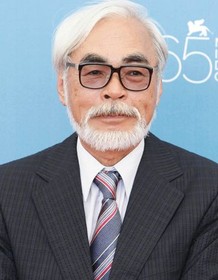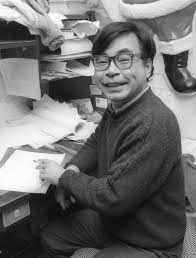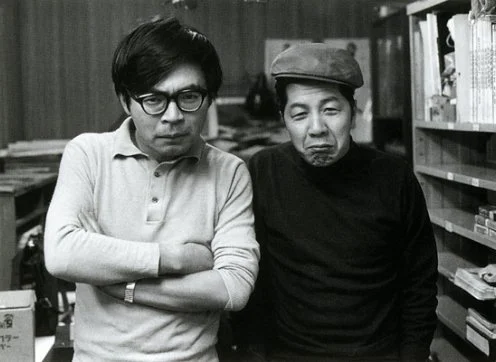Hayao Miyazaki: A Master of Global Animation
Who is Hayao Miyazaki?

Born in 1941 in Tokyo, Hayao Miyazaki was raised in a family with strong artistic roots. His father, Katsuji Miyazaki, was a director at an airplane parts manufacturing company, profoundly influencing young Miyazaki's fascination with aviation. In contrast, his mother, Dola, was a writer, introducing him to the world of literature and tales that would later become central to his creativity. Miyazaki not only inherited an artistic passion from his parents, but he also continued the family tradition, adding his unique touch to the realm of animation. His films and stories prove that tradition and innovation can coexist, producing unforgettable works for future generations.

There, working as an animator, he gained experience under seasoned masters like Isao Takahata, who later became a close collaborator and friend. At Toei, Miyazaki contributed to several films and also had the opportunity to work on his projects, allowing him to refine his distinct style and vision. In the 1970s, after several successful stints at Toei Animation, Miyazaki decided to embark on an independent creative path. Despite the risks, this proved to be a pivotal move, ultimately leading him to craft some of the most esteemed films in global animation history.
The Creation of Studio Ghibli

The philosophy of Studio Ghibli stood out from other production houses. It emphasized hand-drawn animation, a bold choice in an era of escalating digitization. This choice was pivotal in defining the studio's distinct style, marked by depth, detail, and authenticity. Ghibli films often addressed ecological, societal issues and intricate human relationships, presenting them in a nuanced and universal manner, which attracted audiences globally.
Within a few years, Studio Ghibli not only became an icon of Japanese animation but also one of the most influential animation studios globally. Its productions, like "My Neighbor Totoro," "Princess Mononoke," and "Spirited Away," gained international fame and acclaim, contributing to the global popularity of anime and setting a new standard in animation quality.
 "My Neighbor Totoro" - Characteristics and Cultural Significance "My Neighbor Totoro" tells the tale of two young sisters who, after relocating to the countryside, discover the presence of forest spirits, including the mysterious Totoro. The film captures childhood curiosity, the magic moments that appear unexpectedly. Carefully crafted, from realistically depicted daily activities to the fantastical creatures inhabiting the nearby forest, Totoro became not only Studio Ghibli's mascot but also a cultural icon worldwide. Its simple yet endearing appearance drew fans across ages. While initially not a commercial success, the film became iconic, symbolizing childhood innocence, a connection with nature, and the magic of the mundane.
"My Neighbor Totoro" - Characteristics and Cultural Significance "My Neighbor Totoro" tells the tale of two young sisters who, after relocating to the countryside, discover the presence of forest spirits, including the mysterious Totoro. The film captures childhood curiosity, the magic moments that appear unexpectedly. Carefully crafted, from realistically depicted daily activities to the fantastical creatures inhabiting the nearby forest, Totoro became not only Studio Ghibli's mascot but also a cultural icon worldwide. Its simple yet endearing appearance drew fans across ages. While initially not a commercial success, the film became iconic, symbolizing childhood innocence, a connection with nature, and the magic of the mundane.
 "Princess Mononoke" and Its Environmental Message "Princess Mononoke" narrates the conflict between humans and nature deities, focusing on Ashitaka, a young prince attempting to mediate this battle. The film showcases the devastation of the natural environment by technological progress and the growing tension between tradition and modernity. In "Princess Mononoke," Miyazaki avoids clear-cut "heroes" and "villains," subtly emphasizing the complex moral dilemmas of human intervention in nature. The movie became a significant voice in environmental discussions, emphasizing the necessity of harmonious coexistence between humans and nature.
"Princess Mononoke" and Its Environmental Message "Princess Mononoke" narrates the conflict between humans and nature deities, focusing on Ashitaka, a young prince attempting to mediate this battle. The film showcases the devastation of the natural environment by technological progress and the growing tension between tradition and modernity. In "Princess Mononoke," Miyazaki avoids clear-cut "heroes" and "villains," subtly emphasizing the complex moral dilemmas of human intervention in nature. The movie became a significant voice in environmental discussions, emphasizing the necessity of harmonious coexistence between humans and nature.
 "Howl's Moving Castle" - Literary Adaptation and a Unique Representation of Magic Based on the British novel by Diana Wynne Jones, "Howl's Moving Castle" revolves around Sophie, a young girl cursed to age prematurely. Seeking a cure, she joins Howl, a mysterious sorcerer, and his extraordinary, moving castle. Filled with magic, romance, and character transformations, "Howl's Moving Castle" exhibits Miyazaki's unique approach to literary adaptations. While differing from the original novel, it retains its spirit, adding new narrative and visual layers. The film also reflects on beauty, aging, and transience, suggesting that magic can be found in unexpected places.
"Howl's Moving Castle" - Literary Adaptation and a Unique Representation of Magic Based on the British novel by Diana Wynne Jones, "Howl's Moving Castle" revolves around Sophie, a young girl cursed to age prematurely. Seeking a cure, she joins Howl, a mysterious sorcerer, and his extraordinary, moving castle. Filled with magic, romance, and character transformations, "Howl's Moving Castle" exhibits Miyazaki's unique approach to literary adaptations. While differing from the original novel, it retains its spirit, adding new narrative and visual layers. The film also reflects on beauty, aging, and transience, suggesting that magic can be found in unexpected places.
 Several Other Significant Films and Their Impact
Several Other Significant Films and Their Impact
Besides the mentioned titles, Miyazaki crafted numerous works that have left a lasting imprint on animation. "Spirited Away" tells the story of a young girl trying to save her parents in a mysterious spirit world, highlighting themes of identity and growing up. "The Wind Rises" pays tribute to aviation pioneers, reflecting human passion and dreams. Each of Miyazaki's films brings something unique to the realm of animation, showcasing the array of themes, characters, and tales that can be expressed in this medium.
Miyazaki's Style and Technique:
Traditional Animation Methods in the Age of Digitization.
While the animation world was increasingly delving into digitization and utilizing modern computer techniques, Hayao Miyazaki stubbornly adhered to traditional hand-drawing methods. Many of his films, including the famous "My Neighbor Totoro" and "Princess Mononoke," were created from thousands of hand-drawn frames. His fondness for traditional methods aimed to maintain authenticity and depth in his works, allowing for greater expression and subtlety than possible with digital techniques.
The Significance of Nature and Ecology in His Films.
Nature and ecology played a pivotal role in many of Miyazaki's films. Nature is portrayed as a force of beauty, mystique, but also something that's at risk from human actions. In "Princess Mononoke," the conflict between industry and conserving the natural environment is depicted, while "My Neighbor Totoro" portrays the joy and wonder of nature. These films not only emphasize the importance of caring for the planet but also showcase the splendor and magic of the natural world.
Strong Female Characters and Their Role in Narration.
In contrast to many traditional film narratives where female characters are often one-dimensional or play secondary roles, Miyazaki's films are filled with strong, independent women playing central roles in the stories. San from "Princess Mononoke," Chihiro from "Spirited Away," and Sophie from "Howl's Moving Castle" are just a few examples of characters who not only drive the plot but also present complex, multi-dimensional portraits of women at various life stages.
Miyazaki as a Feminist Creator.
Some critics and observers label Miyazaki as a feminist creator due to the way he portrays women in his films. Instead of portraying them as damsels in distress or merely romantic figures, Miyazaki crafts women as leaders, warriors, caregivers, and key plot drivers. He gives them a voice and power often denied to them in other film genres.
Humanistic Perspective and Universal Messages.
Beyond standout techniques and strong female characters, Miyazaki's films are profoundly humanistic, emphasizing the value of empathy, understanding, and love. Whether the message concerns caring for the planet, understanding cultural differences, or simply mutual care and support, Miyazaki's films consistently remind of values that bind us all as humans.
Impact on Global Culture and Animation.
Global Recognition and Popularity of Miyazaki's Films: Hayao Miyazaki's films have not only become iconic in Japan but have also gained recognition and popularity worldwide. His unique stories, merging traditional Japanese culture with universal themes, appeal to both children and adults alike. When one mentions anime, many globally first think of Miyazaki's works. "Spirited Away" and "My Neighbor Totoro" are just some of the films that have become global phenomena, transcending language and cultural barriers.
 Awards and Achievements.
Awards and Achievements.
Recognition for Miyazaki does not end at popularity; his films have received numerous prestigious awards globally. Notably, "Spirited Away" won the Oscar for Best Animated Feature in 2003. This historic achievement made it the first non-English language film to win this award, affirming his unparalleled prowess in animation.
Inspiration for Other Creators.
Miyazaki's impact on global animation and the film industry is profound. Many directors and animators, both in Japan and abroad, draw inspiration from his works. His cinematic tales, focusing on nature, ecology, and intricate female characters, have set the standard for future generations of creators. Miyazaki's films not only raise the bar for animation quality but also push the boundaries of narration, inspiring others to experiment and craft deeper, more intricate animated tales.
 Conclusion...
Conclusion...
Hayao Miyazaki is not just an animated film director; he's an artist who, through his work, has bridged tradition with modernity, the East with the West. Although rooted in Japanese culture, his films resonate with universal human experiences and emotions, making them accessible to audiences worldwide. This represents not just commercial and artistic success but a triumph in cultural diplomacy. In an era where many creators aim to tailor their work for a global audience, Miyazaki remains true to his roots while offering tales that connect people regardless of their backgrounds.
One of the most astonishing aspects of Miyazaki's oeuvre is his ability to weave tales that, though seemingly simple and fairy-tale-like at a glance, harbor deep reflections on human nature, society, and the world around us. His films don't just end with a standard "happily ever after," but instead leave the viewer with a question and a longing for understanding.
"I didn't make a film that provides answers. I made a film that poses questions." - Hayao Miyazaki.
"Strong Japanese Women"
see book by the author
of the page
未開 ソビエライ
An enthusiast of Asian culture with a deep appreciation for the diverse philosophies of the world. By education, a psychologist and philologist specializing in Korean studies. At heart, a programmer (primarily for Android) and a passionate technology enthusiast, as well as a practitioner of Zen and mono no aware. In moments of tranquility, adheres to a disciplined lifestyle, firmly believing that perseverance, continuous personal growth, and dedication to one's passions are the wisest paths in life. Author of the book "Strong Women of Japan" (>>see more)
Personal motto:
"The most powerful force in the universe is compound interest." - Albert Einstein (probably)
Mike Soray
(aka Michał Sobieraj)
未開 ソビエライ
An enthusiast of Asian culture with a deep appreciation for the diverse philosophies of the world. By education, a psychologist and philologist specializing in Korean studies. At heart, a programmer (primarily for Android) and a passionate technology enthusiast, as well as a practitioner of Zen and mono no aware. In moments of tranquility, adheres to a disciplined lifestyle, firmly believing that perseverance, continuous personal growth, and dedication to one's passions are the wisest paths in life. Author of the book "Strong Women of Japan" (>>see more)
Personal motto:
"The most powerful force in the universe is compound interest." - Albert Einstein (probably)
Mike Soray
(aka Michał Sobieraj)
Write us...
Ciechanów, Polska
dr.imyon@gmail.com
___________________
inari.smart
Would you like to share your thoughts or feedback about our website or app? Leave us a message, and we’ll get back to you quickly. We value your perspective!
 "My Neighbor Totoro" - Characteristics and Cultural Significance "My Neighbor Totoro" tells the tale of two young sisters who, after relocating to the countryside, discover the presence of forest spirits, including the mysterious Totoro. The film captures childhood curiosity, the magic moments that appear unexpectedly. Carefully crafted, from realistically depicted daily activities to the fantastical creatures inhabiting the nearby forest, Totoro became not only Studio Ghibli's mascot but also a cultural icon worldwide. Its simple yet endearing appearance drew fans across ages. While initially not a commercial success, the film became iconic, symbolizing childhood innocence, a connection with nature, and the magic of the mundane.
"My Neighbor Totoro" - Characteristics and Cultural Significance "My Neighbor Totoro" tells the tale of two young sisters who, after relocating to the countryside, discover the presence of forest spirits, including the mysterious Totoro. The film captures childhood curiosity, the magic moments that appear unexpectedly. Carefully crafted, from realistically depicted daily activities to the fantastical creatures inhabiting the nearby forest, Totoro became not only Studio Ghibli's mascot but also a cultural icon worldwide. Its simple yet endearing appearance drew fans across ages. While initially not a commercial success, the film became iconic, symbolizing childhood innocence, a connection with nature, and the magic of the mundane. "Princess Mononoke" and Its Environmental Message "Princess Mononoke" narrates the conflict between humans and nature deities, focusing on Ashitaka, a young prince attempting to mediate this battle. The film showcases the devastation of the natural environment by technological progress and the growing tension between tradition and modernity. In "Princess Mononoke," Miyazaki avoids clear-cut "heroes" and "villains," subtly emphasizing the complex moral dilemmas of human intervention in nature. The movie became a significant voice in environmental discussions, emphasizing the necessity of harmonious coexistence between humans and nature.
"Princess Mononoke" and Its Environmental Message "Princess Mononoke" narrates the conflict between humans and nature deities, focusing on Ashitaka, a young prince attempting to mediate this battle. The film showcases the devastation of the natural environment by technological progress and the growing tension between tradition and modernity. In "Princess Mononoke," Miyazaki avoids clear-cut "heroes" and "villains," subtly emphasizing the complex moral dilemmas of human intervention in nature. The movie became a significant voice in environmental discussions, emphasizing the necessity of harmonious coexistence between humans and nature. "Howl's Moving Castle" - Literary Adaptation and a Unique Representation of Magic Based on the British novel by Diana Wynne Jones, "Howl's Moving Castle" revolves around Sophie, a young girl cursed to age prematurely. Seeking a cure, she joins Howl, a mysterious sorcerer, and his extraordinary, moving castle. Filled with magic, romance, and character transformations, "Howl's Moving Castle" exhibits Miyazaki's unique approach to literary adaptations. While differing from the original novel, it retains its spirit, adding new narrative and visual layers. The film also reflects on beauty, aging, and transience, suggesting that magic can be found in unexpected places.
"Howl's Moving Castle" - Literary Adaptation and a Unique Representation of Magic Based on the British novel by Diana Wynne Jones, "Howl's Moving Castle" revolves around Sophie, a young girl cursed to age prematurely. Seeking a cure, she joins Howl, a mysterious sorcerer, and his extraordinary, moving castle. Filled with magic, romance, and character transformations, "Howl's Moving Castle" exhibits Miyazaki's unique approach to literary adaptations. While differing from the original novel, it retains its spirit, adding new narrative and visual layers. The film also reflects on beauty, aging, and transience, suggesting that magic can be found in unexpected places. Several Other Significant Films and Their Impact
Several Other Significant Films and Their Impact 




